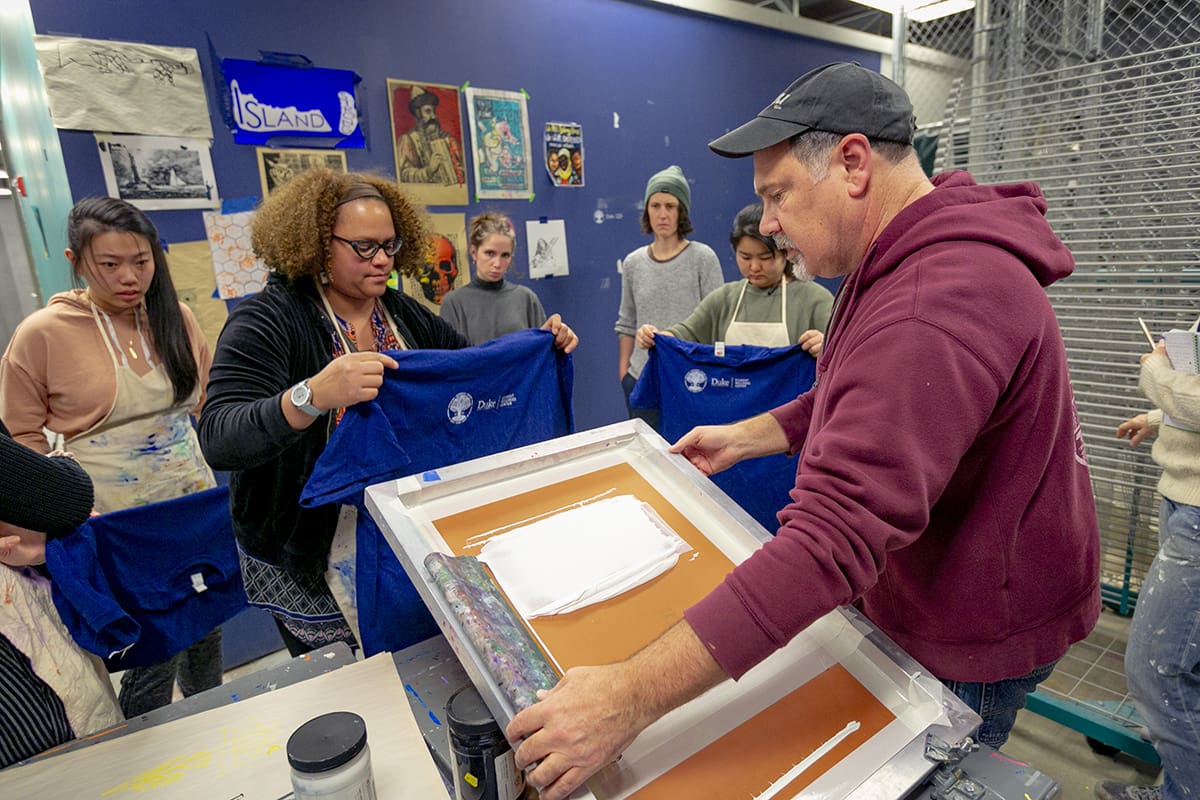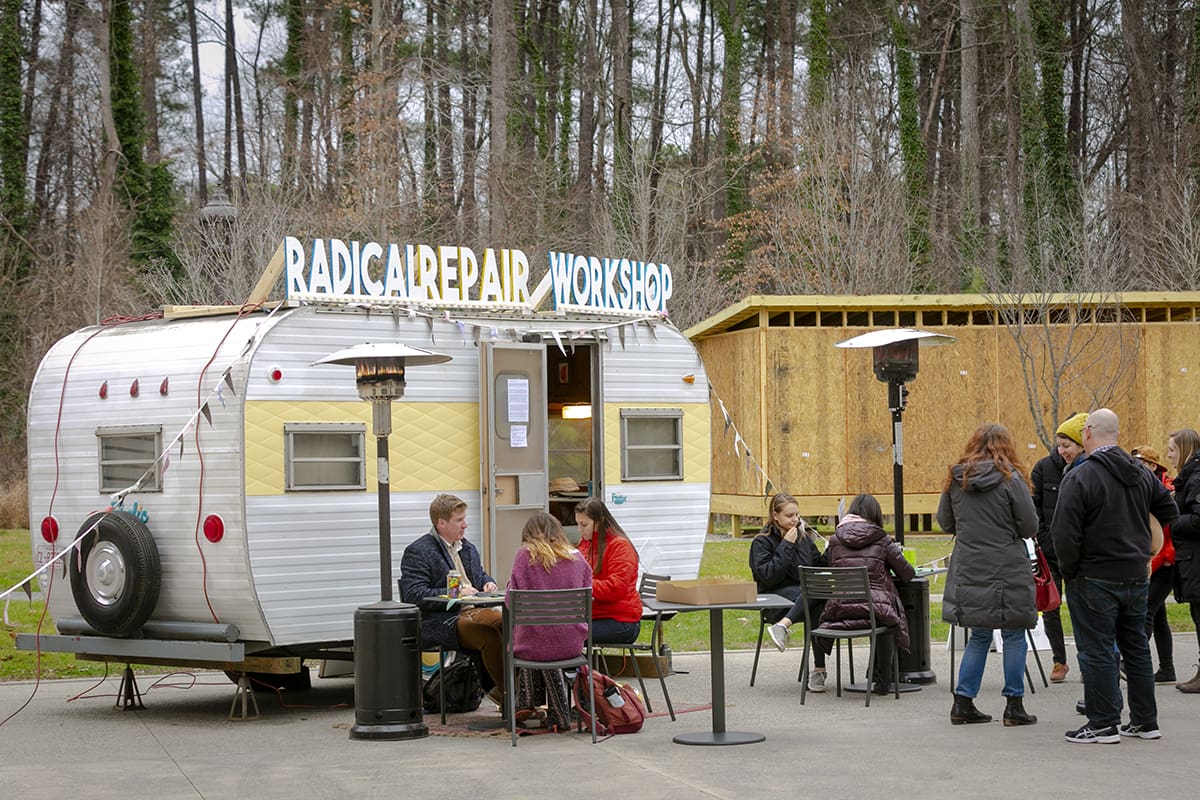
As part of the university’s response to COVID-19, all upcoming DukeCreate in-person workshops in Spring 2020 have been cancelled. We are currently exploring opportunities for online arts tutorials with our talented instructors, and we will update our wonderful community as soon as we are able. In the meantime, we took a look back at where this program started and how it has grown over the past eight years. Thank you to everyone who has helped make that possible, and to those of you who are new: we hope to see you at a workshop in the future! (Update: DukeCreate is now online!)
What started as a “trickle”—the word Scott Lindroth used to describe the early days of DukeCreate—has become a tsunami of opportunities for students to participate in the arts at Duke.
DukeCreate, a series of free hands-on arts workshops designed to help Duke students, staff, and faculty develop creative skills, grew out of the popularity of the Duke Arts Annex, a drop-by space place for students to make art on Gattis Street that opened in 2012. This new demand suggested that Duke students were hungry for the arts.
Lindroth, Duke’s Vice Provost for the Arts, responded to this grassroots interest. “We set up rooms for screen printing and ceramics facilities for students to informally come in. Initially the idea was that the students would have an unstructured, completely flexible access to these facilities,” says Lindroth.
“And that was good, but we found that equipment sometimes got broken and things were unkempt. So that prompted us to think about how we could bring more structure and more mentoring that would still maintain that flexible access and non-judgmental engagement with the arts. And that is really the origins of DukeCreate.”

Lindroth and Art, Art History, and Visual Studies instructor Bill Fick, who had been brainstorming with Lindroth, shared the idea with colleagues in Student Affairs who oversee the Arts Annex. Ali Shumar (then assistant director for arts and media, student engagement, now operations director at the Rubenstein Arts Center) structured these ideas into a rotating workshop series with support from Christopher Roby (assistant vice president for Student Affairs).
The growth of DukeCreate has been explosive. There were 35 workshops in its inaugural semester, Fall 2015, and in Spring 2020 more than 80 workshops were scheduled.
“As time went on, I was very interested in moving beyond standalone workshops and finding ways we could coordinate with classes or other things going on at Duke,” says Lindroth. Partnerships have been key to developing DukeCreate, and while the series is now programmed by the Office of the Vice Provost for the Arts, continued collaboration with Student Affairs is key. Partnerships also enable DukeCreate to work more closely with departments to complement academic courses.
For example, DukeCreate has been a helpful partner in expanding the Arts of the Moving Image (AMI) Filmcraft Series, which the department created in 2018 following its move to the Rubenstein Arts Center.
AMI Program Director Josh Gibson explains why DukeCreate has been so important to his program. “The Filmcraft workshops [taught by professional cinematographer Steve Milligan] have allowed us to deepen and standardize technical instruction for our classes, while opening up more class time for specialized instruction.”
“Because these workshops are also open to the Duke community and marketed via DukeCreate, we also see them as a valuable recruiting tool to get students into our classes,” says Gibson. “They help students see the equipment and resources that are available to them and also encourages them to delve deeper into moving image production.”

Other academic courses are taking advantage of the program as well. For instance, Julia McHugh, Trent A. Carmichael Curator of Academic Initiatives at the Nasher Museum of Art, planned to do a ceramics workshop through DukeCreate for her class, “The Museum Object: Art and Artifact on Display.” “In the course, we closely examine artworks and their materials, as well as the ways in which museums preserve and care for objects. One of our units is on ancient ceramics,” says McHugh. “I’m eager for the students to connect historical context with the physical practice of making objects. It’s really difficult to teach technique in the classroom, which is why I’m so excited to partner with DukeCreate to put clay in my students’ hands and link theory with practice.”
Through promotional partnerships, DukeCreate also increases awareness of other arts workshops on campus, making it a useful one-stop shop for students to navigate hands-on resources. Programs at the Wellness Center, such as knitting groups and drum circles, and Innovation Co-Lab Roots Workshops (presented by the Office of Information Technology) are all accessible via the DukeCreate calendar.

DukeCreate has also presented workshops in collaboration with the Kenan Institute For Ethics. The “What Now?” seminar course for first years has brought students to the Arts Annex for art projects. Comments from students from this class and others consistently note that they love getting out of their heads—where they live for most academic courses—and using their hands to create.
Instructors also enjoy the different vibe an arts course can bring. Bradley Rogers, assistant professor of theater studies, has offered his services as a ceramics teacher at the Arts Annex.
“Fixations on grades can turn classrooms into places of fear, and fear prevents real learning,” says Rogers. “That’s why I’m always eager to look for ways to make learning feel more like a part of everyday life. The beauty of my workshop is that I get to teach students how to do something very special, without any sense of fear or expectation.”
While Rogers reached out to DukeCreate to offer his expertise, DukeCreate finds their instructors in a variety of ways. Some artists are from the community, and the MFA programs at Duke bring a rich variety of potential instructors. “I try to meet with new MFA candidates each fall semester to see if they would be interested in teaching any classes,” says Kevin Erixson, director of DukeCreate. “These students are very talented and often come with a lot of previous teaching experience, and their classes have been very well received.” MFA students this year have taught classes in podcasting, Photoshop, “Ballet for All Bodies,” and Broadway and hip-hop dance. Visiting artists at the Rubenstein Arts Center have also taught workshops, increasing the opportunity to forge meaningful connections with students.

“Student interest has also guided our decision-making on the types of workshops offered,” says Erixson. “For example, we are working to offer music workshops in response to student requests, and the overwhelming demand for our ceramics workshops led us to create the Ceramics Academy, which extends the normal two-hour workshop format into a four-weekend course.”
Durham artist and Ceramics Academy instructor Anna Wallace especially enjoyed teaching the extended class. “I always love working with the Duke students at DukeCreate. There is such diversity in the student body and I get to work with everyone from first years to post-docs to employees. The longer format allows the students to learn so much more about the material of clay and gets them so engaged that most students seem to want to come in on their own now and continue learning and making. This series gives them the confidence to do so.”
Even as DukeCreate grows in scope and numbers, it continues to evolve. There have been some growing pains, but Lindroth finds it exciting. “It’s a moving target when we try to figure out the best way to handle registration and manage waitlists, but we’re learning a lot,” he says.
“When we introduced DukeCreate I had already been Vice Provost for a while and I was very nervous at first about starting something new. What if it fails? What if it’s a flop? But I thought, let’s just do this. If it fails, we recalibrate or try something else. But we had a hunch that this would work.”
And that hunch has paid off for Duke students, faculty, and staff—700 of them last semester alone—and counting.




